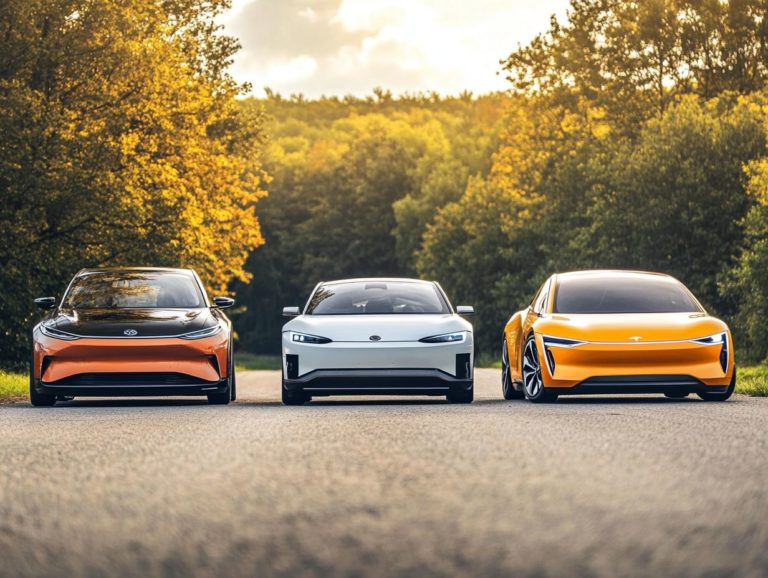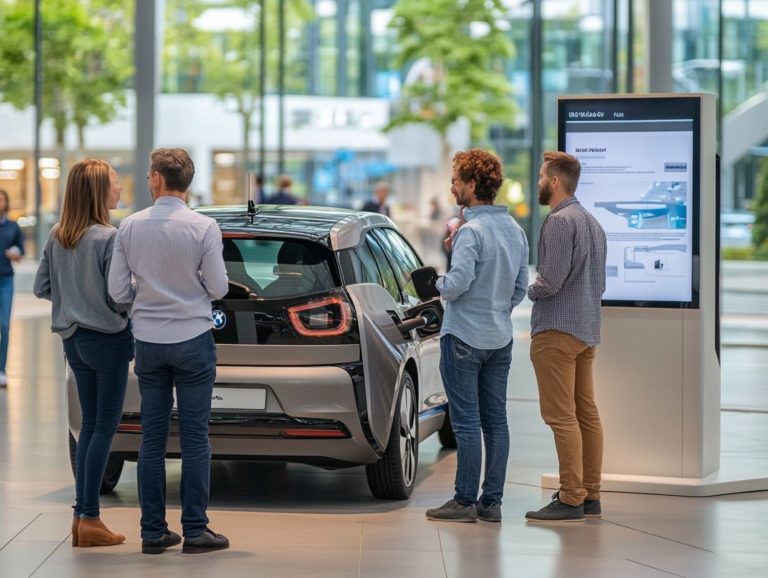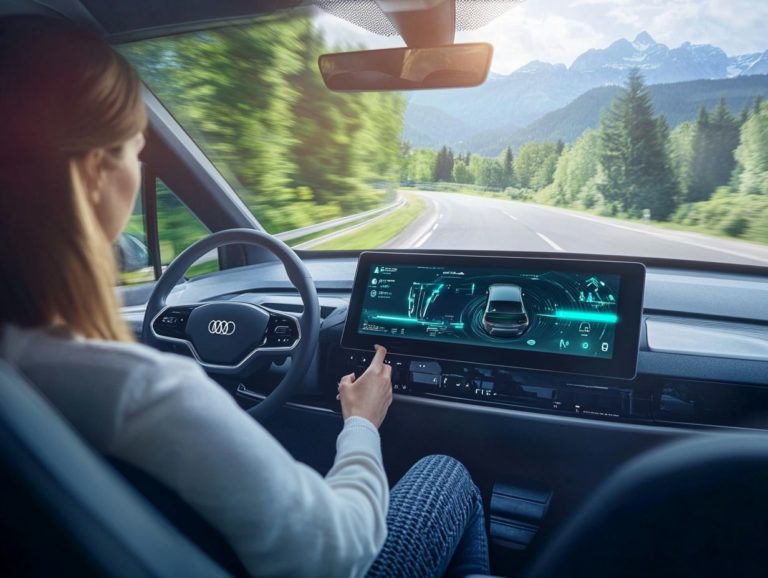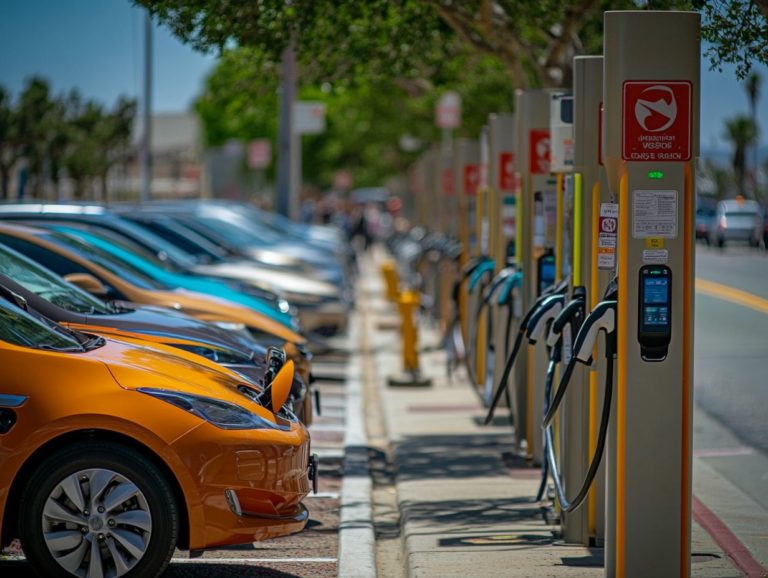what are the long-term costs of owning an ev?
Owning an electric vehicle (EV) can feel like stepping into the future. However, it’s crucial to understand the financial commitments that come with it.
The initial purchase price, enticing tax incentives, and ongoing expenses like maintenance, charging, and insurance all play an important part in shaping your ownership experience.
This guide breaks down these factors so you can make the best choice for your future! You will gain insights on navigating the financial landscape of EV ownership while uncovering potential long-term savings.
Whether you’re contemplating your first EV or looking to deepen your understanding, this guide will equip you with the knowledge you need to make informed decisions.
Contents
- Key Takeaways:
- The Initial Investment of Owning an Electric Vehicle
- Maintenance and Repair Costs
- Charging Costs
- Insurance Costs
- Resale Value of Electric Vehicles
- How Electric Vehicles Compare to Gas Vehicles
- Big Savings Over Time with an Electric Vehicle
- Frequently Asked Questions
- What are the long-term costs of owning an EV?
- How does depreciation affect the long-term costs of owning an EV?
- Do EVs require less maintenance compared to traditional gasoline vehicles?
- How does insurance for an EV differ from that of a traditional vehicle?
- Are electricity costs a major factor in the long-term costs of owning an EV?
- What are some ways to reduce the long-term costs of owning an EV?
Key Takeaways:
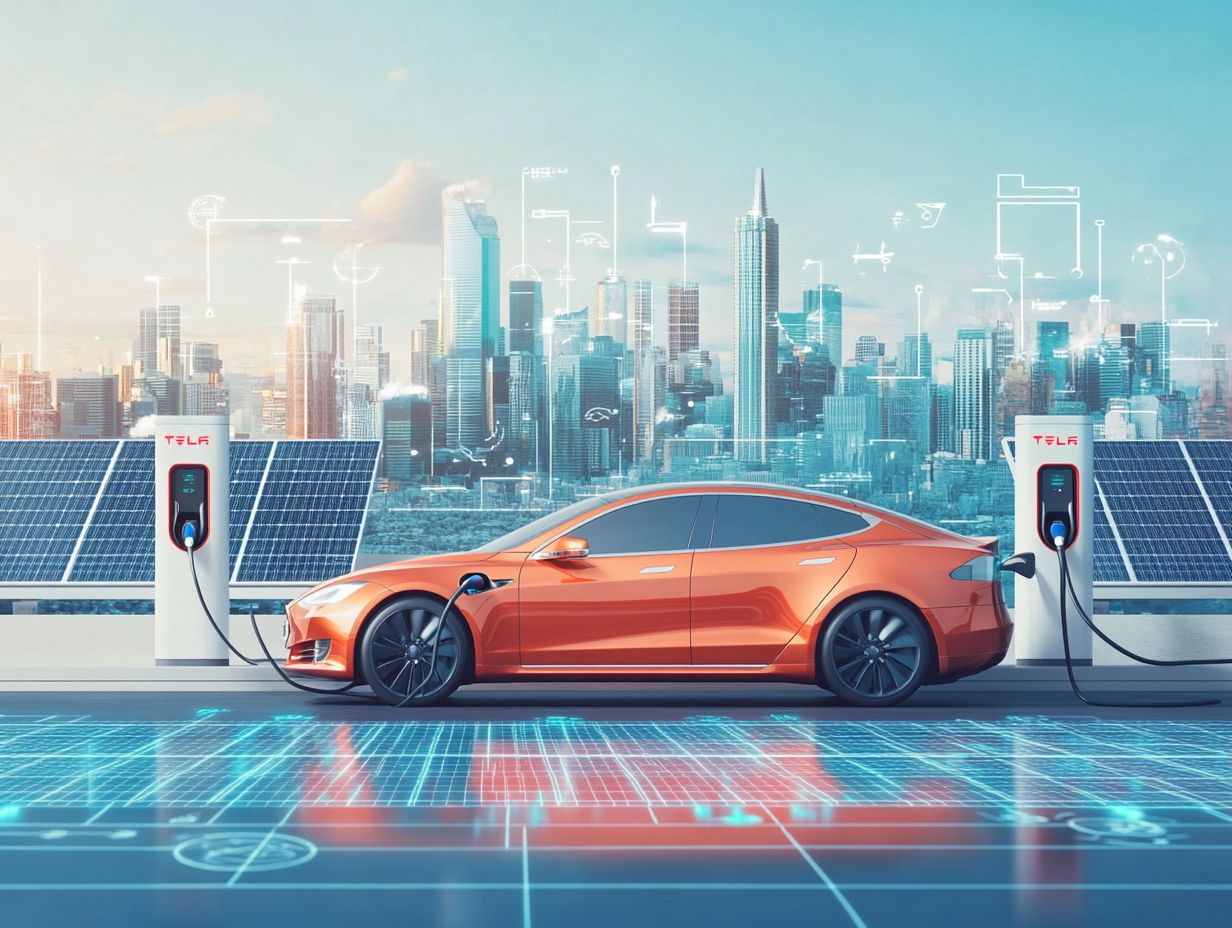
The initial investment for an EV may be high, but tax incentives and rebates can help offset the cost.
Maintenance and repair costs for EVs are generally lower than those for gas-powered vehicles.
Charging costs vary depending on your charging method, whether at home or on the go. Understanding these costs can help you budget effectively.
The Initial Investment of Owning an Electric Vehicle
Investing in electric vehicles (EVs) involves many important considerations. These include upfront costs, purchase incentives, and potential long-term savings linked to lower maintenance and fuel expenses.
As the electric vehicle market continues to evolve, federal EV tax credits and incentives from auto dealers become essential in assessing the total cost of EV ownership. This is particularly relevant in regions like the Pacific Northwest, where these elements can greatly influence your financial decision-making compared to conventional vehicles.
Cost of the Vehicle
The cost of purchasing an electric vehicle can vary compared to gas cars. This variation is influenced by several key factors including the initial price, available incentives, and long-term savings all crucial to your decision-making process.
Take Tesla s Model 3, for example; it starts at around $40,000. While gas-powered sedans may catch your eye with their lower initial costs, they can lead to significantly higher fuel expenses over time. In contrast, models like the Hyundai Kona Electric and Chevrolet Bolt EV typically range from $30,000 to $37,000. Though they may appear pricier upfront, certain states offer incentives that can dramatically reduce that cost.
When you factor in the lower maintenance and charging costs associated with electric vehicles, the total cost of ownership over five years often favors EVs. Evaluating these factors is essential for anyone considering the switch.
Tax Incentives and Rebates
Tax incentives and rebates significantly lessen the financial burden of purchasing electric vehicles, making them a more appealing choice. Governments at both federal and local levels recognize the importance of advancing sustainable transportation and have launched various programs to facilitate the shift to cleaner alternatives.
The federal EV tax credit helps reduce the purchase price of electric vehicles, making them more affordable. With the recent Inflation Reduction Act, eligibility for these incentives has broadened, allowing more people to access cleaner vehicles.
Many local utility companies also provide rebates and perks for EV owners. These benefits can include:
- Reduced electricity rates during off-peak hours
- Cashback offers on EV chargers
These financial incentives not only help you make environmentally responsible choices but also contribute to a growing market for electric vehicles. Ultimately, they promote sustainability and help reduce carbon emissions over time.
Maintenance and Repair Costs
Electric vehicles generally come with lower maintenance and repair costs compared to gas-powered counterparts. This advantage arises from having fewer moving parts and requiring less frequent servicing, leading to substantial long-term savings for owners.
Comparing Electric and Gas-Powered Vehicles
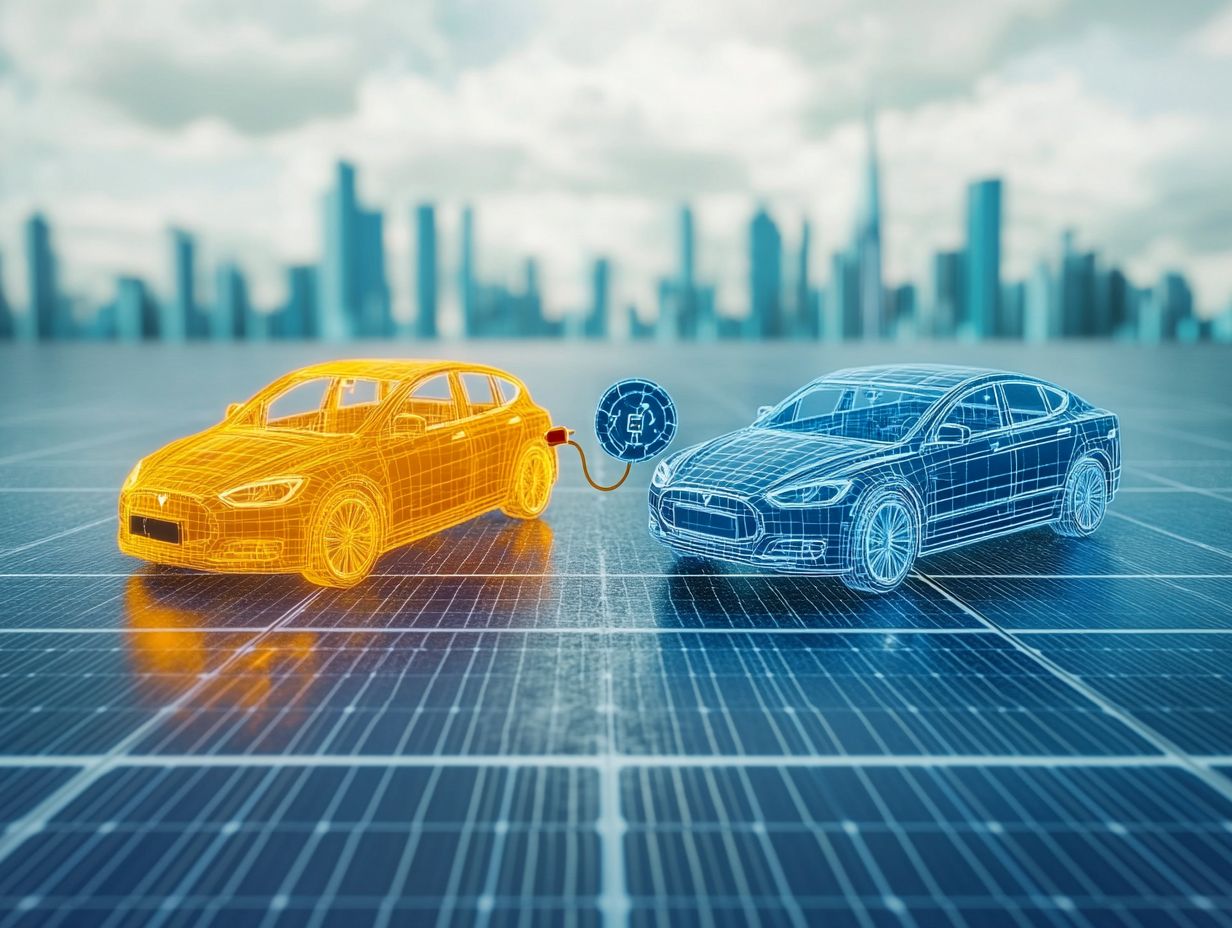
Electric vehicles (EVs) have lower maintenance costs than gas-powered vehicles. Fewer moving parts mean less wear and tear.
Say goodbye to oil changes EVs don t require engine oil at all! This significantly reduces your routine maintenance costs.
Plus, regenerative braking, which uses energy from braking to recharge the battery, helps extend brake life, cutting down replacement needs.
In contrast, gas vehicles need regular tune-ups and fuel system cleanings, which add up over time. Battery replacement is a factor for EVs, but overall maintenance costs are still lower.
These factors greatly affect the total cost of ownership for both vehicle types.
Charging Costs
Charging costs play a key role in the expenses of owning an electric vehicle. Your choice between home charging and public stations can impact your overall costs.
Home Charging vs. Public Charging
Choosing between home and public charging stations can affect your expenses. Each option has its advantages.
Home charging allows you to plug in overnight and start each day with a full battery. However, it may require an initial investment in equipment.
Public charging stations are great for road trips but may have longer wait times. Knowing your options helps you make the best choice for your lifestyle.
Insurance Costs
Insurance costs for electric vehicles can vary significantly compared to gas cars. Your specific situation will determine your potential savings or costs.
Factors Affecting Insurance Rates
Several factors influence insurance rates for electric vehicles, such as repair costs and safety ratings. EVs often have higher repair costs due to specialized parts.
However, EVs generally have lower accident rates because of advanced safety features. This can lead to lower insurance premiums.
The higher initial cost of EVs can also affect insurance prices. Understanding these factors can help you predict your ownership costs accurately.
Resale Value of Electric Vehicles
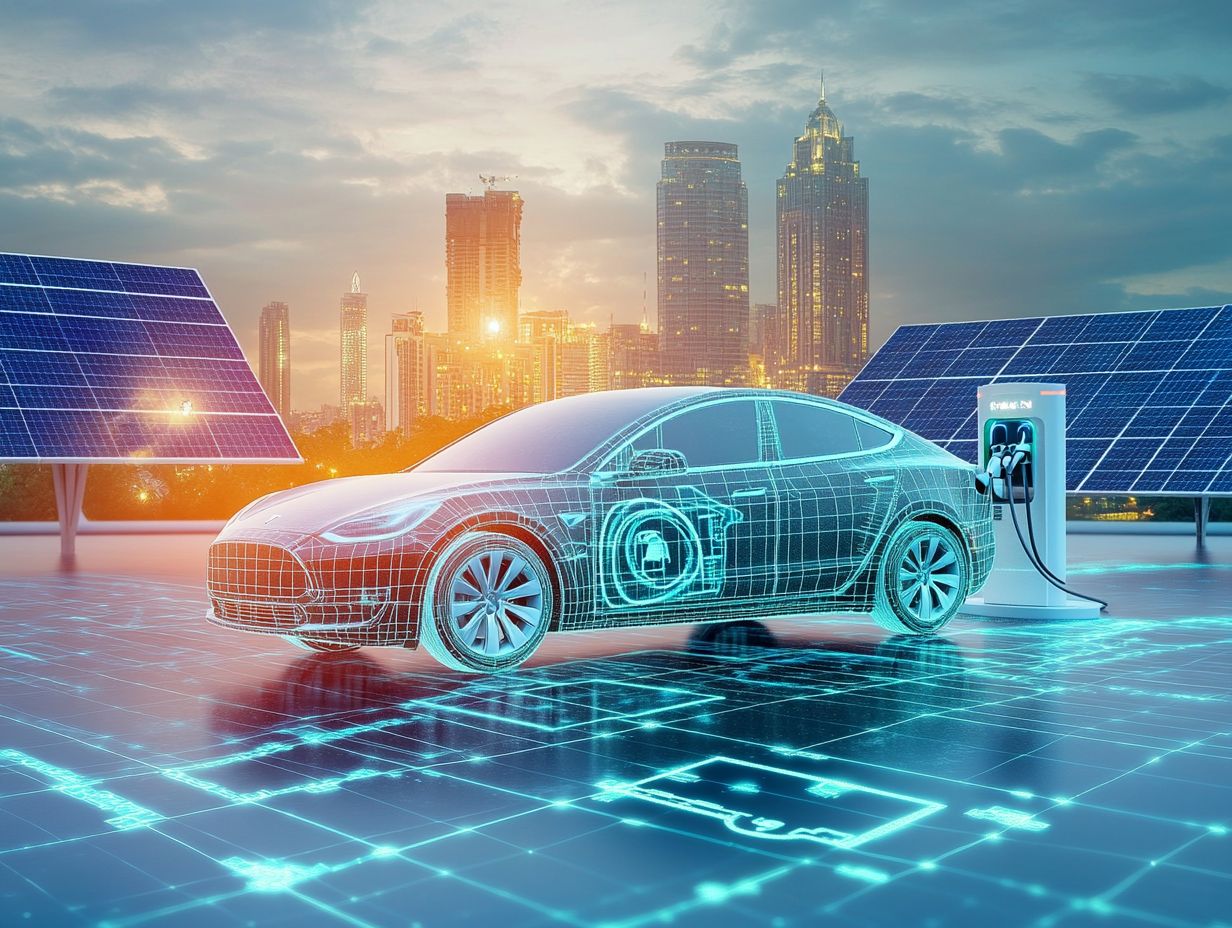
The resale value of electric vehicles often differs from gas-powered cars. Factors like depreciation and consumer demand shape this disparity.
Understanding these trends can guide your investment decisions for the future.
How Electric Vehicles Compare to Gas Vehicles
When you think about resale value, you’ll see that electric vehicles depreciate differently than gas-powered vehicles, which can impact your long-term ownership costs.
Research indicates that electric vehicles typically lose value about 50% faster than gasoline cars within the first three years after purchase. This quick depreciation is largely due to rapid advancements in technology and battery life, making older models less appealing.
For example, a 2020 study found that while a gas-powered sedan retained around 60% of its value after three years, a similar electric vehicle held onto only about 40%.
Regional incentives and changing consumer preferences also play a crucial role, as more buyers are attracted to the lower operating costs and environmental benefits of EVs, further shifting market dynamics.
Big Savings Over Time with an Electric Vehicle
Owning an electric vehicle can lead to significant savings in the long run. These savings include lower fuel costs and reduced maintenance expenses, making EV ownership more financially advantageous over time.
Fuel Savings
One of the standout benefits of owning an electric vehicle is the potential for impressive fuel savings compared to traditional gas cars, thanks to their efficiency ratings and favorable electricity costs.
The difference in fuel efficiency is remarkable: electric vehicles can cost as little as a few cents per mile, while gasoline-powered alternatives often exceed ten cents per mile. This translates to considerable reductions in your monthly fuel expenses over time.
As you factor in average mileage alongside the growing network of charging stations, the overall savings become even more evident. By switching to an electric vehicle, you’ll enjoy lower costs and contribute to reducing reliance on fossil fuels, aligning yourself with a sustainable future.
Lower Maintenance Costs
Electric vehicles generally have lower maintenance costs compared to gas cars, mainly due to having fewer mechanical parts and requiring less frequent servicing.
This advantage comes from electric vehicles using electric motors rather than complex internal combustion engines.
With fewer components that can wear out such as oil filters, spark plugs, and exhaust systems these vehicles feature a streamlined design that enhances reliability and reduces repair needs.
Many electric models also utilize regenerative braking, which helps recharge the battery while you drive, meaning less wear on the brakes and significantly extending their lifespan.
As a result, the long-term financial benefits become clear, making electric vehicles an appealing option for budget-conscious drivers.
Frequently Asked Questions
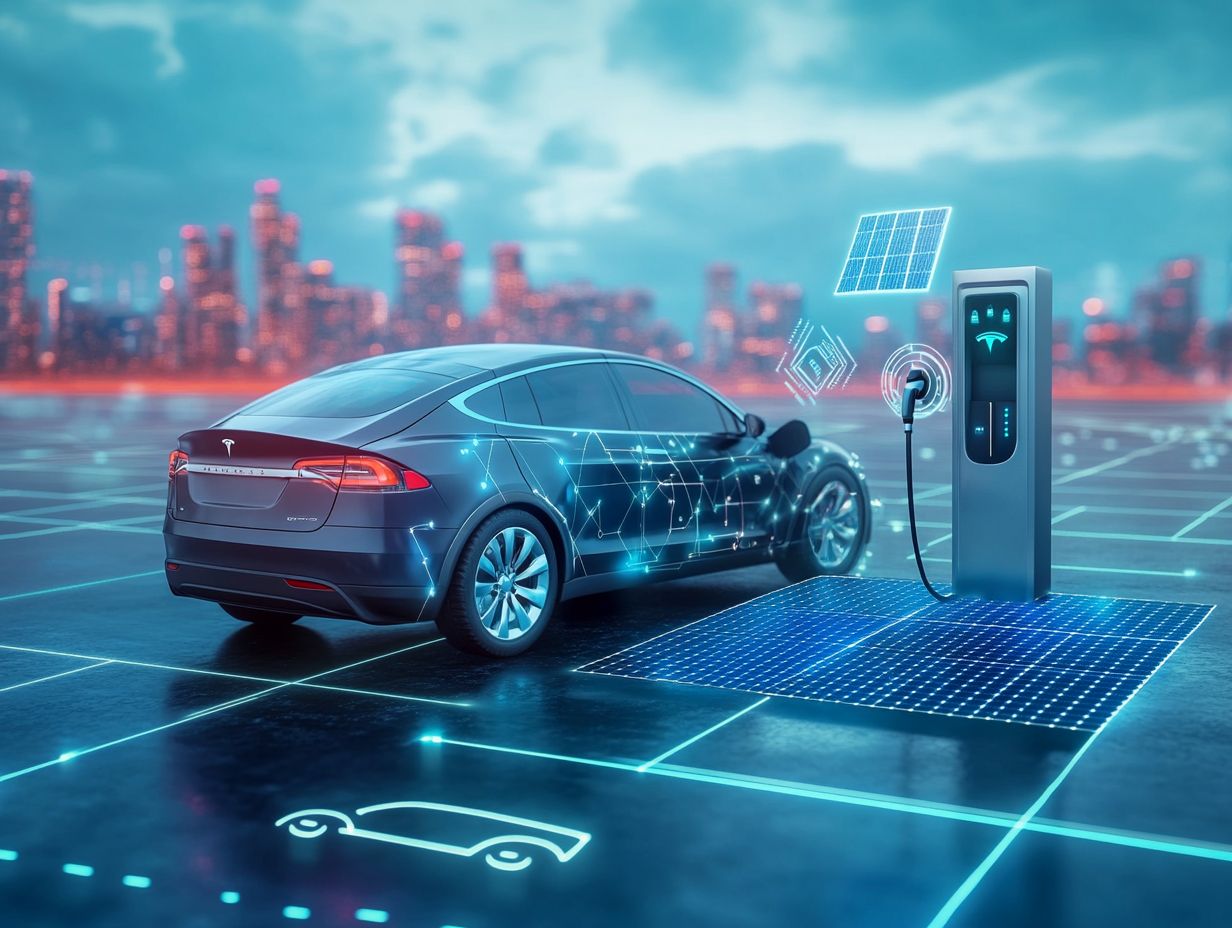
What are the long-term costs of owning an EV?
The long-term costs of owning an EV include depreciation, maintenance, insurance, and electricity costs.
How does depreciation affect the long-term costs of owning an EV?
Depreciation is the decrease in value of a vehicle over time. Like any vehicle, EVs also experience depreciation. Depending on the make and model, the depreciation of an EV can range from 30% to 50% within the first three years, which can greatly affect long-term costs.
Do EVs require less maintenance compared to traditional gasoline vehicles?
Yes, EVs usually require less maintenance than traditional gasoline vehicles. With fewer moving parts, there is less wear and tear, leading to lower maintenance costs over time.
How does insurance for an EV differ from that of a traditional vehicle?
Insurance for an EV may be slightly higher due to the expensive battery pack and other specialized components. However, as EV technology becomes more widespread, insurance costs are expected to decrease.
Ready to save on your next vehicle? Consider going electric!
Are electricity costs a major factor in the long-term costs of owning an EV?
Yes, electricity costs play a big role in the long-term expenses of owning an EV. However, charging an EV is usually cheaper than filling up a gas tank.
Many EV owners can charge their vehicles at home. This reduces reliance on public charging stations and can help save even more on electricity costs.
What are some ways to reduce the long-term costs of owning an EV?
Research different EV models to find one that loses value slowly. This can help you save money in the long run.
Regular maintenance is key! Taking care of your vehicle can help you avoid expensive repairs.
Don’t forget to check for tax incentives or rebates for buying an EV. These can significantly lower your overall costs!

